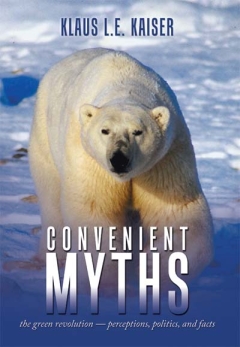|
|
CONVENIENT MYTHS
the
green revolution —
perceptions, politics, and
facts |
 |
by Klaus L.E. Kaiser, is the first clearly written, comprehensive
book looking at the green desires and expectations and juxtaposing
these with the physical and chemical facts and realities.
CONVENIENT MYTHS explains in common terms why many of these
green ideas will remain myths and dreams. The laws of nature cannot
be broken. No matter how much we may desire the opposite.
Keywords / Chapters:
|
Climate change, global warming, IPCC, government, media, propaganda, deficit, inflation, earthquakes, volcanos,
pollution, ice ages, greenhouse gases, carbon dioxide, methane, water vapor, sea ice, Arctic, polar bears, seals, whales,
energy, temperature, cod, salmon, El Nino, hurricanes, typhoons, earth, freshwater, deforestation, physics, chemistry, biology,
freshwater, aquifers, desalination, disinfection, fluoridation, air, ozone, smog, acid rain, crude oil, coal, natural gas, electric power,
electric cars, fossil fuels, natural gas, nuclear, geothermal, heat pump, wave power, osmosis, wind, solar energy, biofuels, ethanol, engine,
hybrid, hydrogen, light, food, organic, genetically modified, fish, contaminants, sun, radiation, light, X-rays,
weather, droughts, floods, diseases, longevity, cancer, Alzheimer's, malaria, progress |
|
Book Excerpts
Introduction
In every field of science, research is progressing at an astounding rate. From astronomers finding new stars and galaxies in unfathomable distances, to
nanoparticle-research developing molecule-sized "machines" for medical and industrial purposes, the pace of new discoveries and inventions is unparalleled.
For example, the Chemical Abstracts Service, which began to collate information on each chemical substance known to man, listed in the 1950's about 1 million
compounds. In the 1980's the number had risen to 10 million. Most recently, in 2008, it exceeded 100 million.
Undoubtedly, the "computer age" revolutionized scientific discoveries through easy cataloguing, sorting, and filtering of vast amounts of data. Together with
the rapidly increasing processing power and much faster, and almost limitless data storage capacities, computers have changed our life and work forever.
The development of the Internet is another good example. Initially it helped scientists to communicate. After the civilian use expanded, business usurped it to
advertise and sell their products. Now, the entertainment industry has a firm grip on the bandwidth with on-demand-movies, etc. Looking at the latest flyers of
major computer vendors, they advertise "entertainment systems," not speed of data processing, or better systems for word processing, spreadsheet calculations,
database, or other traditional computer functions.
Despite this computer-enabled "information age," what has not changed is the discordance between scientific facts, politics, and common perception. In fact,
at least in some aspects, they are steadily drifting apart. Hollywood, a term used here as a synonym for the entertainment industry in general, is doing its
best to perpetuate and reinforce this chasm between fact and perception. If we watch a futuristic movie, we know it is a fantasy. However, if we watch what
purports to be a documentary, we expect unbiased facts and interpretations. With increasing regularity though, documentary movies contain computer-generated
animations, which frequently are figments of imagination....
Back to excerpts
|
|
| Copyright © 2010-2023, Klaus L.E. Kaiser. All Rights Reserved. |
|



